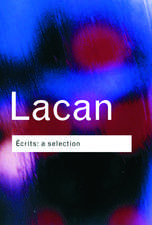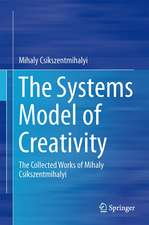Mathematical Psychology in Progress: Recent Research in Psychology
Editat de Edward E. Roskamen Limba Engleză Paperback – 11 oct 1989
Din seria Recent Research in Psychology
- 15%
 Preț: 632.37 lei
Preț: 632.37 lei -
 Preț: 379.86 lei
Preț: 379.86 lei - 15%
 Preț: 637.13 lei
Preț: 637.13 lei -
 Preț: 377.73 lei
Preț: 377.73 lei - 15%
 Preț: 631.40 lei
Preț: 631.40 lei -
 Preț: 382.36 lei
Preț: 382.36 lei - 15%
 Preț: 635.65 lei
Preț: 635.65 lei - 15%
 Preț: 642.36 lei
Preț: 642.36 lei - 15%
 Preț: 634.18 lei
Preț: 634.18 lei -
 Preț: 392.60 lei
Preț: 392.60 lei - 15%
 Preț: 637.59 lei
Preț: 637.59 lei - 15%
 Preț: 635.65 lei
Preț: 635.65 lei - 15%
 Preț: 634.49 lei
Preț: 634.49 lei - 15%
 Preț: 645.47 lei
Preț: 645.47 lei - 20%
 Preț: 440.22 lei
Preț: 440.22 lei - 15%
 Preț: 653.33 lei
Preț: 653.33 lei - 5%
 Preț: 712.60 lei
Preț: 712.60 lei - 15%
 Preț: 634.68 lei
Preț: 634.68 lei - 18%
 Preț: 950.96 lei
Preț: 950.96 lei - 15%
 Preț: 639.59 lei
Preț: 639.59 lei - 15%
 Preț: 634.00 lei
Preț: 634.00 lei - 15%
 Preț: 636.80 lei
Preț: 636.80 lei - 18%
 Preț: 724.00 lei
Preț: 724.00 lei - 15%
 Preț: 642.18 lei
Preț: 642.18 lei - 15%
 Preț: 635.15 lei
Preț: 635.15 lei - 15%
 Preț: 639.08 lei
Preț: 639.08 lei - 15%
 Preț: 638.76 lei
Preț: 638.76 lei - 15%
 Preț: 640.55 lei
Preț: 640.55 lei - 15%
 Preț: 637.28 lei
Preț: 637.28 lei - 15%
 Preț: 630.57 lei
Preț: 630.57 lei - 15%
 Preț: 636.80 lei
Preț: 636.80 lei - 15%
 Preț: 638.57 lei
Preț: 638.57 lei - 15%
 Preț: 633.02 lei
Preț: 633.02 lei - 15%
 Preț: 647.08 lei
Preț: 647.08 lei - 15%
 Preț: 638.43 lei
Preț: 638.43 lei - 15%
 Preț: 649.71 lei
Preț: 649.71 lei - 15%
 Preț: 637.93 lei
Preț: 637.93 lei - 15%
 Preț: 634.18 lei
Preț: 634.18 lei - 15%
 Preț: 632.37 lei
Preț: 632.37 lei -
 Preț: 376.80 lei
Preț: 376.80 lei - 15%
 Preț: 644.18 lei
Preț: 644.18 lei - 15%
 Preț: 640.55 lei
Preț: 640.55 lei - 15%
 Preț: 637.78 lei
Preț: 637.78 lei -
 Preț: 377.57 lei
Preț: 377.57 lei - 15%
 Preț: 635.15 lei
Preț: 635.15 lei - 18%
 Preț: 946.87 lei
Preț: 946.87 lei - 15%
 Preț: 647.27 lei
Preț: 647.27 lei - 15%
 Preț: 633.53 lei
Preț: 633.53 lei
Preț: 648.05 lei
Preț vechi: 762.42 lei
-15% Nou
Puncte Express: 972
Preț estimativ în valută:
124.01€ • 132.60$ • 103.39£
124.01€ • 132.60$ • 103.39£
Carte tipărită la comandă
Livrare economică 18 aprilie-02 mai
Preluare comenzi: 021 569.72.76
Specificații
ISBN-13: 9783540516866
ISBN-10: 3540516867
Pagini: 396
Ilustrații: VIII, 385 p.
Dimensiuni: 170 x 242 x 21 mm
Greutate: 0.63 kg
Ediția:Softcover reprint of the original 1st ed. 1989
Editura: Springer Berlin, Heidelberg
Colecția Springer
Seria Recent Research in Psychology
Locul publicării:Berlin, Heidelberg, Germany
ISBN-10: 3540516867
Pagini: 396
Ilustrații: VIII, 385 p.
Dimensiuni: 170 x 242 x 21 mm
Greutate: 0.63 kg
Ediția:Softcover reprint of the original 1st ed. 1989
Editura: Springer Berlin, Heidelberg
Colecția Springer
Seria Recent Research in Psychology
Locul publicării:Berlin, Heidelberg, Germany
Public țintă
ResearchCuprins
I — Theory, Metatheory, and Measurement.- Current directions in mathematical learning theory.- Transforming probabilities without violating stochastic dominance.- Formal models and axiomatic measurement.- An axiomatic approach towards testing bilinear attitude models.- The representation of dynamic structures.- Random variables and qualitative probability representations.- Elements of a model-theoretic framework for probabilistic measurement.- II — Choice, Perception, Cognition, and Performance.- Some modified inhibition models for response time series.- Mental processing and distraction.- A procedure for facilitating an expert’s judgements on a set of rules.- A generalized “discounting the background” model extending the traditional Grassmannian approach to colour vision.- Choice basis, a model for multi-attribute preference: some more evidence.- An elementary formal categorization of a corpus of spelling errors.- Rules for parallelprocessing networks with adaptive structure.- III — Psychometrics and Theory of Data.- New results in test theory without an answer key.- Item sampling, guessing, partial information and decision-making in achievement testing.- The linear logistic test model and heterogeneity of cognitive strategies.- Testable conditions for the existence of a qualitative J-scale in unfolding.- Graph theoretical representations of proximities by monotonic network analysis (MONA).- Midpoint sequences, intransitive J scales, and scale values in unidimensional unfolding.- Predicting an optimal threshold in Boolean analysis of questionnaires.- An impossibility theorem for fair bidimensional representation: towards a biproportional solution.- Thresholds and independence in proportional representation.- Author index.
















